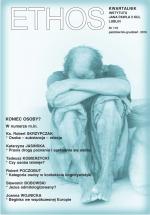PRAXIS DROGĄ POZNANIA I SPEŁNIANIA SIĘ OSOBY. Myśl Karola Wojtyły jako inspiracja dla pedagogów
Praxis as the Way to Know the Person and the Way of the
Person’s Fulfi llment: The Thought of Karol Wojtyła as an Inspiration for Educators
Author(s): Katarzyna JasińskaSubject(s): Systematic Theology, Pastoral Theology
Published by: Katolicki Uniwersytet Lubelski Jana Pawła II - Instytut Jana Pawła II, Wydział Filozofii
Keywords: person; Karol Wojtyła’s concept of praxis; transitive and intransitive consequences of an action; fulfi llment of the person; meaning of education
Summary/Abstract: The starting point of Wojtyła’s anthropology and ethics is the fact of ‘man acting,’ given in the phenomenological experience. In the metaphysical order the person precedes her actions, which was expressed in classical philosophy by means of the adage: operari sequitur esse (acting follows existence). In the epistemological order in turn an analysis of the subject’s actions makes it possible to recognize her not only in the aspect of her existence, but also in the aspect of her nature as an acting subject. In this sense an analysis of human praxis underlies philosophical anthropology, revealing the spiritual nature of the person manifested through her actions. Following St. Thomas Aquinas, Wojtyła considered a human act (actus humanus) as the core of human praxis. An action has consequences of two kinds. Its transitive consequences are objectified in its actual outward results, while its intransitive, enduring consequences remain within the acting person, introducing changes of moral nature in her. The article underscores the significance of the enduring consequences of an action for the moral growth (or moral degradation) of the person. A comparison of Wojtyła’s conception of praxis with its Marxist interpretation shows that praxis actually manifests a personalist dimension. In this sense praxis turns out the ground on which humanity finds its accomplishment in accordance with the truth about the human being. Thus Wojtyła’s anthropology, apart from expounding the truth about the human person, points to the signifi cance of anthropo-praxis, namely to the fact that human actions need to be preformed with reference to the truth about things. Education, which is a special kind of action, is focused on the accomplishment of the person’s humanity. Personalist education, in which the student is approached as a rational and free person, should aim at enabling her to perform (morally good) actions and, through them, to accomplish her humanity. Wołtyła’s merit was to show that apart from attaining its facultative goals, praxis, due to the enduring consequences of the person’s actions, determines her becoming (fieri) morally good. The latter goal, described in terms of the autoteleology of the person determines not only the meaning of education, but above all the fulfi llment of the human life.
Journal: Ethos. Kwartalnik Instytutu Jana Pawła II KUL
- Issue Year: 29/2016
- Issue No: 4
- Page Range: 42-55
- Page Count: 14
- Language: Polish
- Content File-PDF

